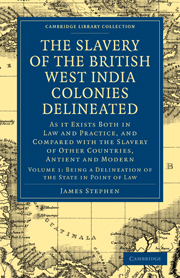 The Slavery of the British West India Colonies Delineated
The Slavery of the British West India Colonies Delineated Book contents
- Frontmatter
- PREFACE
- Contents
- PRELIMINARY CHAPTER: Of the Necessity and Importance of describing the State in question, and the general Plan of the Work
- BOOK I OF THE SLAVERY OF OUR COLONIES CONSIDERED AS A LEGAL INSTITUTION
- CHAPTER I Of the Origin and Authority of the Colonial Slave Laws in general
- CHAPTER II Of the Persons who are subject to Slavery in our Colonies
- CHAPTER III Of the legal Nature and Incidents of this Condition, as they respect and constitute the Relation between the Slave and his Master
- CHAPTER IV Of the legal Nature and Incidents of Colonial Slavery, as they respect its Relations to Persons of Free Condition in general, the Master and his Delegates excepted
- CHAPTER V Of the legal Nature and Incidents of West India Slavery, in its Relations to the Police and Civil Government of the Country
- CHAPTER VI Of this State of Slavery in respect of its Commencement and Dissolution
- Appendix, No. 1
- Appendix, No. II
- Appendix, No. III
- Appendix, No. IV
- Appendix, No. V
CHAPTER V - Of the legal Nature and Incidents of West India Slavery, in its Relations to the Police and Civil Government of the Country
Published online by Cambridge University Press: 07 October 2011
- Frontmatter
- PREFACE
- Contents
- PRELIMINARY CHAPTER: Of the Necessity and Importance of describing the State in question, and the general Plan of the Work
- BOOK I OF THE SLAVERY OF OUR COLONIES CONSIDERED AS A LEGAL INSTITUTION
- CHAPTER I Of the Origin and Authority of the Colonial Slave Laws in general
- CHAPTER II Of the Persons who are subject to Slavery in our Colonies
- CHAPTER III Of the legal Nature and Incidents of this Condition, as they respect and constitute the Relation between the Slave and his Master
- CHAPTER IV Of the legal Nature and Incidents of Colonial Slavery, as they respect its Relations to Persons of Free Condition in general, the Master and his Delegates excepted
- CHAPTER V Of the legal Nature and Incidents of West India Slavery, in its Relations to the Police and Civil Government of the Country
- CHAPTER VI Of this State of Slavery in respect of its Commencement and Dissolution
- Appendix, No. 1
- Appendix, No. II
- Appendix, No. III
- Appendix, No. IV
- Appendix, No. V
Summary
We have examined this singular condition of man as settled by law, in its relations, first to the master or owner, and next to all other free individuals in the community: it remains to consider, in a few particulars, the condition of the slave when regarded as a subject; or, at least, as an object of civil government.
In reviewing the situation of man as a member of civil society, it seems a just and convenient division, to consider, first, what advantages he derives from the body politic; and afterwards, to what civil duties, charges, and discipline he is subjected: in other words, what society gives to him on the one hand, and what it takes away, or exacts from him, on the other. I shall therefore adopt this method; and endeavour to state a brief debtor and creditor account between the enslaved negro, and the state to which he belongs.
The former part of this task is, in great measure, already accomplished.
Trivial and fruitless though the legal protection has been shewn to be, to which the colonial slave is entitled against free persons, it is the only benefit which he can be said to derive from society; except that further protection which it gives to him, against the violence or injustice of men of his own condition.
The latter, it must be admitted, is nearly as ample as could be wished; for such petty trespasses as slaves commit against each other, are commonly punished or repaired by the intervention of the masters; and all more serious offences against a fellow slave, are punished with sufficient severity by the civil magistrate.
- Type
- Chapter
- Information
- The Slavery of the British West India Colonies DelineatedAs it Exists Both in Law and Practice, and Compared with the Slavery of Other Countries, Antient and Modern, pp. 196 - 333Publisher: Cambridge University PressPrint publication year: 2010First published in: 1824


